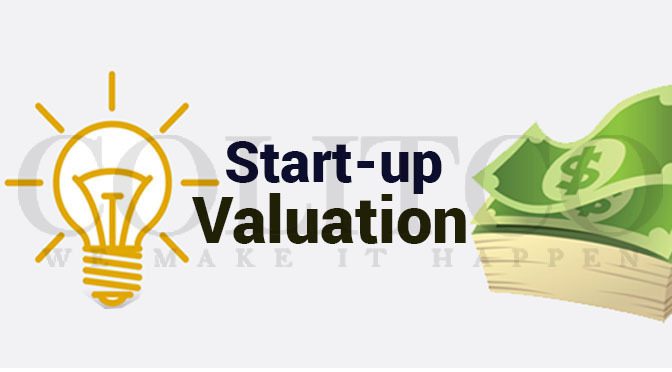A start-up is something like an egg that has been laid in the nest but yet hatched. The incubation period is very crucial. Similarly, a start-up is a venture which has just been started by an entrepreneur on a small level.
Whether or not it is successful and should one go forward with the idea depends upon the start-up valuation methods and profitability of the business operations.
Now, first of all, it’s important to know what startup valuation means
What is Startup Valuation?
Startup valuation is a method of determining or analyzing the value of a start-up company. The methods of valuation of these companies are different as they are at a pre-revenue stage and run with minimal funds generally collected from friends and families.
A company is valued through the startup valuation process. Before reaching the revenue generation stage, a company requires startup valuation and small business funding. The value of a business can be easily calculated by using financial records.
The valuation is done through the EBDITA formula.
EBITDA= Earning before Interest +Taxes +Depreciation + Amortization
Venture capital investors engage in start-up business funding when the start-up is not generating any revenue. Hence convincing the investors is always a challenge. Every entrepreneur needs money for product development, infrastructure, marketing, and hiring staff. Before pitching the business idea to Venture capital investors for small business funding, one needs to do a valuation of the start-up. Investors want to know the worth of a start-up.
The startup valuation process is a relative science and can hence be initially frustrating for the entrepreneur. The factors in favour of robust startup valuation are powerful prototype, the potential for a good number of customers, good reputation, revenue generation potential, supply and demand synchronization, a well-built distribution channel, and hotness of industry.
If the company is in a poor industry sector with low margins and high competition, with dysfunctional management and non-functional product, it shall attract low Startup valuation.
Methods of Startup Valuation
 Image Source:- Startupflux
Image Source:- Startupflux
The methods used for start-up valuation are briefly described below.
1) Berkus method:
As per the method developed by Dave Berkus, startup valuation is performed taking into account the following five factors
a) Technology
b) Production and consequent sales
c) Strategic relationship in the core market
d) Execution, and
e) Basic value.
2) Cost to duplicate approach:
This approach takes into account all costs and expenses associated with the start-up. Development of products and purchase of different assets are also scrutinized.
3) Discounted cash flow (DCF) approach:
This method focuses on estimating the value of the current investment on the basis of expected cash flows in the future.
4) Comparable method:
This startup valuation method makes use of comparison with a similar type of earlier business for determining the worth.
5) Valuation by multiple methods:
This startup valuation method is used when the start-up has already generated noticeable profits.
6) Venture Capital method:
This startup valuation method relies on pre-money and post-money valuations.
7) Risk factor summation approach:
In this approach, all risks associated with the business are taken into account to gain start-up business funding.
How Does Start–up Valuation Work?
 Image Source:- Times of India
Image Source:- Times of India
Different start-up valuation models are used for distinct stages of business. It is very important to know the actual stage before picking up the appropriate method.
1) Seed stage:
At this stage, the business does not have any revenue, assets, or team. Berkus start-up valuation method or Venture Capital Valuation method are the most suited at this stage for start-up business funding.
2) Round A Stage:
At this stage, one may have a concrete idea and a prototype might also have been built. Even some revenue might have also been generated by now. Cost-to-duplicate method and Venture Capital start-up valuation method are the best options at this stage for attracting small business funding.
3) Round B Stage:
This stage refers to the situation when the company is in a position to grow and expand. Revenue generation potential of the organization can be assessed now using methods like the DCF model and the Valuation by multiples method.
However, it may be mentioned that various Start-up valuation models provide only estimates and there is no exact and specific foolproof way to completely convince the investor for start-up funding.
How Start-up Valuation Calculated?
 Image Source:- InnovationsLab – Central European University
Image Source:- InnovationsLab – Central European University
Step 1:- Assess possession of the company
The first thing to be done for carrying out start-up valuation is to assess the balance sheet. There are numerous assets like software, products, patents, customers, partnerships that help one to determine the valuation of a start-up. Furthermore, identifying key process indicators like revenue, customer success rate, daily usage statistics provide an arbitrary valuation route to Venture capital investors.
Step 2:- Choose a model
Different models are used at pre-revenue and post-revenue generation stages. Berkus and risk factor summation start-up valuation methods are best to earn small business funding. For the post-revenue stage, steady cash flow and sustainable revenues are used for valuation. One should also calculate the revenue run rate and revenue growth rate. Customer acquisition cost is also very important at this stage.
How a Start–up is Valued in India?
The future of all start-ups is uncertain, so gaining start-up business funding is a tricky task everywhere. Valuation is time-specific and depends on future cash flows. There are two ways to value start-ups in India: Venture Capital method and Discount cash flow start-up valuation method.
Start-up valuation depends on several factors like owners’ background, experience, and passion, the potential of business, Competitive landscape, etc.
CASE STUDIES
First Case Study:- Nykaa, Falguni Nayyar
 Image Source:- Entrackr
Image Source:- Entrackr
Recently, India has seen a tremendous growth of beauty, cosmetics, and wellness startups. Nykaa has been started as a multi-brand online beauty retailer. It has emerged as a leading retail player in the beauty and lifestyle industry. It has launched many products like oils, eyeshadows, and facemasks. The company is selling 300,000 products across 1500 brands. In the financial year 2018-19, it earned a profit of Rs. 1,159 crore.
Nykaa, owned by Falguni Nayyar earned a valuation around Rs. 9000 Crore ($ 1.2 billion)[efn_note] Nykaa targets$1.2 billion valuation in funding round planned this year [/efn_note] from Venture capital investors.
It has also raised $ 14 million from TPG Growth, a private equity firm. Besides this, it has also raised $ 30 million as start-up business funding from Steadview Capital. Nykaa has already raised $ 100 million as small business funding since its inception. It has other investors like TVS Capital, Sharp Ventures, and Hero Enterprise.
Second Case Study:- Agnikul Cosmos, Srinath Ravichandran, and Moin SPM
 Image Source:- Jhalak
Image Source:- Jhalak
There is a mix up of private players, investors, and entrepreneurs in space start-ups in India. Agnikul Cosmos founded by Srinath Ravichandran and Moin SPM, is developing a satellite launch vehicle for payload capacity up to 100 kg18. The company has already designed a 3D printed rocket engine. Agnikul was started in IIT Chennai (NCCRD). It has raised INR 23.4 crore ($ 3.1 Mn)[efn_note] Artha Venture Fund invests Rs 3.6 crore in Agnikul [/efn_note] as start-up business funding.
It has Venture capital investors like Pi Ventures, Artha Ventures, Lets Venture, Globe Vestors, CIIE, and Speciale Invest. Technology-based start-ups are pushing their boundaries to earn small business funding. Even though the risk of investment is high in them, rewards are also good. Agnikul team consists of rocket scientists, senior professionals, and passionate technologists who believe in Agnikul vision. Artha Venture believes that valuation and investments in Agnikul are reasonable, considering the global nature of business.
Colitco brings inspiring articles related to Start-ups, Angel Investors, Venture capitalists, Private Equity, and much more. Keep browsing our website for more start-up oriented articles.













